- Home
- Franklin W. Dixon
The Secret Of The Old Mill thb-3 Page 3
The Secret Of The Old Mill thb-3 Read online
Page 3
The boys listened as Chief Collig further explained, "If the letter B corresponds to the remainder two, after you have done the division, it means the bill is either genuine-or a careful fake. The same way with the remainder, one. The check letter would be A or G; and with the remainder
three, the check letter C
or I, and so on."
"Wow! Some arithmetic!" Chet remarked.
Frank looked thoughtful. "In this case, the test of the divisional check indicates the bill is genuine."
"Exactly," Chief Collig said. "And the portrait of Jackson is good. The border, sometimes called lathe or scrollwork, is excellent."
"But, Chief," said Joe, puzzled, "everything you've mentioned points toward the bill's being the real thing,"
"That's right. However, you'll see through the microscope that the lines in the portrait are slightly grayish and the red and blue fibers running through the bank note have been simulated with colored ink."
In turn, the boys peered through the microscope, observing the points the chief had called to
their attention.
Chief Collig snapped off the light in Chet's microscope and pulled the bill out from under the clips that were holding it in place.
He handed the fake bill to Frank and at the same time gave him a genuine one from his wallet.
"Now feel the difference in the paper quality," he directed.
Frank did so and could tell immediately that the forged bill was much rougher and thicker than the genuine one.
Just then the chief's telephone rang. He answered it, speaking quickly. When he hung up, Chief Collig said, "I must go out on a call, boys. Thanks for bringing in this bill. If you come across any others like it, or clues that might help the police, let me know. In the meantime, I'll relay your description of the suspect to the Secret Service, and also turn this bill over to them."
Chief Collig arose from his desk, and the boys walked out of the building with him. On the way, Joe said, "I wonder if Oscar Smuff has heard of the counterfeiting racket, and is-er-working on it."
"I wouldn't be surprised." The chief sighed. "That fellow will never give up."
The boys did not mention their encounter with Smuff earlier in the afternoon, but they were
fairly certain that Oscar Smuff had trailed the man because he was a stranger in town and had
been carrying a suitcase. The aspiring detective undoubtedly had jumped to the conclusion that the suitcase was filled with counterfeit money.
When the chief had gone, Joe glanced at his watch. "If we're going to meet Dad's train, we'd better get started."
The three boys climbed into the jalopy and drove off. They arrived at the station just as the
four-o'clock train was coming to a halt.
A moment later they spotted Mr. Hardy alighting from the rear car. "Dad!" cried Frank and Joe, and dashed to greet him, followed by Chet.
Fenton Hardy, a tall, distinguished-looking man, smiled broadly. "I appreciate this special reception-and a ride home, too," he added, noticing Chet's jalopy in the lot.
"Right this way, sir." Chet grinned.
Joe took his father's suitcase and everyone went to the car. As they rode along, the boys gave Mr.
Hardy an account of the afternoon's exciting events.
The detective listened intently. In conclusion, Frank said, "Dad, does your new case have anything to do with the counterfeiting ring?"
Mr. Hardy did not answer for a moment. His mind seemed to be focused on another matter.
Finally he said, "No. But I'll be glad to help you boys track down any clues to these
counterfeiters. I have a feeling you'll be on the lookout for them!"
"We sure will!" Joe said emphatically.
As they turned into the Hardy driveway, Frank said, "Maybe more leads will show up around here."
Fenton Hardy agreed. "That's a strong possibility."
They were met at the door by Aunt Gertrude, Mr. Hardy's unmarried sister. She was a tall,
angular woman, somewhat peppery in manner, but extremely kindhearted. Miss Hardy had
arrived recently for one of her frequent long visits with the family. In her forthright manner she was constantly making dire predictions about the dangers of sleuthing, and the terrible fate
awaiting anyone who was a detective.
She greeted her brother affectionately as everyone went into the living room. With a sigh she
asked, "Will you be home for a while this time, Fenton, before you have to go dashing off on another case?"
Chuckling, Mr. Hardy replied, "I'll probably be around for a while, Gertrude-especially if the boys run into any more counterfeit money."
"What! Laura, did you hear that?" Aunt Gertrude turned to a slim, attractive woman who had just entered the room.
"I did." Mrs. Hardy greeted her husband, then urged the boys to explain.
After hearing of Chet's experience, both women shook their heads in dismay. "Well, the sooner those counterfeiters are caught, the better!" Aunt Gertrude declared firmly.
"That's what we figure, Aunty," Joe spoke up. "We'll see what we can do! Right, Frank?"
"You bet."
Chet added, grinning, "With the Hardy boys on their trail, those counterfeiters won't have a chance!"
"And Laura and I will lose sleep worrying," Aunt Gertrude prophesied.
Frank and Joe exchanged winks, knowing that actually she and Mrs. Hardy were proud of the
boys'
sleuthing accomplishments, though sometimes fearful of the dangers they encountered.
"What delayed you today, Fenton?" Aunt Gertrude asked her brother. "Another case, I suppose."
Mr. Hardy explained, "There is a special matter I'm investigating, but I'm not at liberty to talk about it yet."
His next remark diverted the boys' attention from the counterfeiters. "Frank and Joe, will you be free tomorrow to see the surprise I have for you both?" he asked. "It'll be ready late in the afternoon."
"We sure will!" his sons exclaimed together. They knew what they hoped the surprise would be, but did not dare count on it.
The brothers tried without success to coax a hint from their family.
"All I can say," Aunt Gertrude remarked, "is that you're mighty lucky boys!" With a deep sigh she added, "But this surprise certainly won't help my peace of mind!"
"Oh, Aunty!" said Joe. "You don't really worry about us, do you?"
"Oh, no!" she exploded. "Only on weekdays, Saturdays, and Sundays!"
Before Chet left for home, he reminded Frank and Joe of his intention to apply to Elekton
Controls Limited for a job.
Overhearing him, Mr. Hardy was immediately interested. "So you want to enter the scientific field, Chet?"
he said. "Good for you and lots of luck!"
The detective told the boys that the company, in addition to manufacturing controls, was
engaged in secret experiments with advanced electronic controls.
"Not too long ago," he concluded, "I met some of Elekton's officers."
It flashed through Chet's mind that he might ask the detective to make an appointment for him, but he decided not to. He wanted to get the job without an assist from anyone. Frank and Joe
suggested that Chet come for them early the next afternoon.
"I have an idea!" Chet exclaimed. "Let's go earlier and take along a picnic lunch. We'll be right near Willow River. After I apply for a job, we can eat by the water. Then you fellows can help me collect bark and stone specimens."
"Microscope study, eh?" Frank grinned. "Okay. It's a deal."
At supper Aunt Gertrude commented wryly, "There'll be two moons in the sky when Chet
Morton settles down to a job!"
The others laughed, then the conversation reverted once more to counterfeiting. Mr. Hardy
backed up Chief Collig's statement that the bogus twenty-dollar bills being circulated were
clever imitations. "I heard that
the Secret Service is finding it a hard case to crack," he added.
Frank and Joe were wondering about their father's other case. They realized it must be
extremely confidential, and refrained from questioning him.
In the middle of the night, Joe was suddenly awakened by a clattering sound. He leaped out of
bed and rushed across the room to the front window. It was a dark, moonless night, and for a
moment Joe could see nothing.
But suddenly he detected a movement near the front door, then saw a shadowy figure running
down the walk to the street.
"Hey!" Joe called out. "Who are you? What do you want?"
At the end of the walk, the mysterious figure leaped onto a bicycle. It swerved, nearly throwing the rider, but he regained his balance and sped off into the darkness.
"What's going on?" Joe cried out
CHAPTER V
The Bicycle Clue
JOE ran downstairs to the front door, flung it open, and dashed outside. He reached the end of the walk, and peered in the direction the mysterious cyclist had taken. The person was not in
sight.
Puzzled, Joe walked back slowly to the house. Had the stranger come there by mistake? "If not, what did he want?" Joe wondered.
The rest of the Hardy family had been awakened by Joe's cries to the stranger. By this time,
they were clustered at the doorway and all the lights in the house were on.
"What's the matter, Joe?" Aunt Gertrude demanded. "Who were you calling to at this unearthly hour?"
Joe was about to reply when he noticed a large white envelope protruding from the mailbox.
He pulled it out, and saw that his father's name was typed on the front. "This is for you, Dad."
Joe handed the envelope to Mr. Hardy. "That fellow on the bike must have left it."
Joe was besieged with questions, and he explained what had happened.
"It's a funny way to deliver a message," Frank commented.
"Very suspicious, if you ask me!" Aunt Gertrude snapped.
Suddenly they all noticed that Mr. Hardy was frowning at the contents of the envelope-a plain
piece of white paper.
"What does it say, Fenton?" Mrs. Hardy asked anxiously.
He read the typed message: " 'Drop case or else danger for you and family! "
There was silence for a moment, then Aunt Gertrude exclaimed, "I knew it! We can't get a
decent night's sleep with three detectives in the family! I just know there's real trouble
brewing!"
Although she spoke tartly, the others realized Miss Hardy was concerned, as always, for her
brother's safety.
"Now, don't worry, Gertrude," Fenton Hardy said reassuringly. "The boys and I will be on guard against any danger. This note probably is the work of a harmless crank."
Aunt Gertrude tossed her head as though she did not believe this for a moment.
"Let's all look around for clues to the person on the bike," Frank suggested.
Flashlights were procured, and the entire family searched the grounds thoroughly on both sides of the stoop and the walk. As Frank and his aunt neared the end of the front walk, Miss Hardy
cried out, "There's something-next to that bush."
Frank picked up the object. "A bicycle pedal!" he exclaimed. "Aunty, this is a terrific clue! I think we have four detectives in the family!"
His aunt forced a rather embarrassed smile.
"The pedal must've fallen off the bike Joe saw," Frank said. "That's why it swerved."
Back in the house, the family gathered in the kitchen. They were too excited to go back to bed immediately, and the boys were eager to question their father. They all had cookies and
lemonade.
"What case did the warning refer to?" Joe asked Mr. Hardy.
"I can't be sure," the detective replied slowly.
Again the boys wondered about Mr. Hardy's secret case, and longed to know what it involved.
"Maybe the threat is connected with that one," Frank thought. Before the boys went to sleep, they decided to track down the pedal clue early the next morning.
Right after breakfast, Chet telephoned. He told Frank, who took the call, that his sister Iola and her friend Callie Shaw had offered to pack lunch if they could go along on the picnic.
"Swell," Frank said enthusiastically. Callie was his favorite date. "In the meantime, how'd you like to do some sleuthing with us?"
"Sure! What's up?"
Frank quickly told Chet about the excitement of the previous night. "Meet us here as soon as you can."
When Frank and Joe informed Mr. Hardy of their plan to trace the pedal, he nodded approval.
"I must go out of town for a short while," he said. "But first, I'd like to examine the warning note in the lab."
The boys went with him to their fully equipped laboratory over the garage. Mr. Hardy dusted
the note carefully, but when he blew the powder away, there was no sign of a fingerprint.
Holding the note up to the light, Mr. Hardy said, "There's no watermark. Of course, this is not a full sheet of paper."
"Dead end, so far." Joe frowned, "If we could only locate the typewriter this message was written on-"
Shortly after Mr. Hardy had driven off in his sedan, Chet arrived. "Where to, fellows?" he asked as they set off in the Queen.
"Center of town," Joe replied.
On the way, the brothers briefed Chet on their plan, which was to make inquiries at all the
bicycle supply stores. In the first four they visited, Frank showed the pedal and asked if there had been any requests for a replacement that morning. All the answers were negative. Finally,
at the largest supply store in Bayport, they obtained some helpful
information.
"This particular pedal comes from a bike made in Belgium," the proprietor said. "There isn't a store in town that carries parts for it."
The boys were disappointed. As Frank put the pedal back in his pocket he asked the proprietor
where parts for the Belgian bicycle could be purchased.
"It might be worth your while to check over in Bridgeport," the man said. "I think you'll find Traylor's handles them."
"It's an odd coincidence," Frank remarked, when the boys were back in the car. "We've come across two Belgian bikes in two days."
When they reached the Traylor store in Bridgeport, the young detectives learned they had just
missed a customer who had purchased a pedal for a Belgian bike.
"Who was he?" Frank inquired. "I don't know."
"'What did he look like?" Joe asked. The proprietor's brow wrinkled. "Sorry. I was too busy to pay much attention, so I can't tell you much. As far as I can remember, he was a tall boy, maybe about fourteen." The three friends knew this vague description was almost useless. There
probably were hundreds of boys living in the surrounding area who fitted that description.
As the boys reached the street, Joe said determinedly, "We're not giving up!"
"Hey!" Chet reminded his friends. "It's almost time to pick up the girls."
Within an hour the five young people were turning off the highway onto a side road paralleling Elekton's east fence. A little farther on Chet made a right turn and followed the dirt road that led to the rear entrance of the plant.
"Any luck sleuthing?" Pretty, brown-eyed Callie Shaw asked the Hardys.
"What makes you think we were sleuthing?"
"Oh, I can tell!" Callie said, her eyes twinkling. "You two always have that detective gleam in your eyes when you're mixed up in a mystery!"
"They certainly have!" Iola agreed, laughing.
When they reached a grove bordering Willow River, which was to their left, Chet pulled over.
"I'll park here."
The girls had decided they would like to see the changes which had been made in the old mill.
As the gro
up approached Elekton's gatehouse, they were amazed at the transformation.
No longer did the mill look shabby and neglected. The three-story structure had been
completely repainted and the weeds and overgrowth of years cleared away. The grounds and
shrubbery of the whole area were neatly trimmed.
"Look!" said Frank. "There's the mill wheel!"
As the Hardys and their friends watched the huge wheel turning, they felt for a moment that
they were living in olden days. Water which poured from a pond over a high stone dam on the
south side and
through an elevated millrace caused the wheel to revolve.
"Oh!" Callie exclaimed admiringly as she spotted a little bridge over the stream from the falls.
"It looks just like a painting!"
About three hundred yards from the north side of the mill was the closed rear gate to Elekton's ultramodern plant.
"Some contrast between the old and the new!" Joe remarked as they left the dirt road and walked up the front path to the gatehouse.
Suddenly the door opened and a dark-haired, muscular man in uniform came out to meet
them. "What can I do for you?" he asked. "I'm the gate guard here."
"I'd like to apply for a summer job at Elekton," Chet told him.
"Have you an appointment?"
"No," replied Chet. "I guess I should have phoned first."
The guard agreed. "You would've saved yourself time and trouble," he said. "I'm sure there aren't any openings, especially for temporary help."
"Well, couldn't I go in and leave an application with the personnel manager?" Chet asked.
The guard shrugged. "Tell you what-I'll phone the personnel office instead," he offered, and went back into the mill.
While they waited, the five looked around. At the south side of the mill grounds, a slender,
graying man who wore overalls was clipping the low hedges.
"Look, Callie," said Iola, pointing toward a spot near the hedges. "Isn't that quaint? An old flour barrel with ivy growing out of it!"
"Charming." Callie smiled.
The girls and boys started over toward the mill for a closer inspection. At that same moment
the guard came to the door. "Just as I told you," he called out to Chet. "No openings! Sorry!"

 The Great Pumpkin Smash
The Great Pumpkin Smash Who Let the Frogs Out?
Who Let the Frogs Out? Return to Black Bear Mountain
Return to Black Bear Mountain A Treacherous Tide
A Treacherous Tide Bug-Napped
Bug-Napped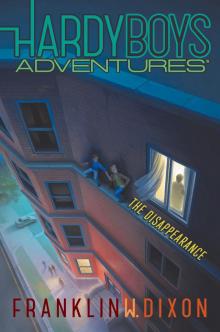 The Disappearance
The Disappearance Sea Life Secrets
Sea Life Secrets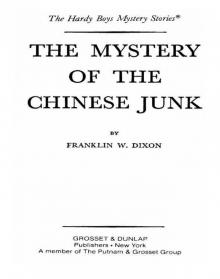 The Mystery of the Chinese Junk
The Mystery of the Chinese Junk A Skateboard Cat-astrophe
A Skateboard Cat-astrophe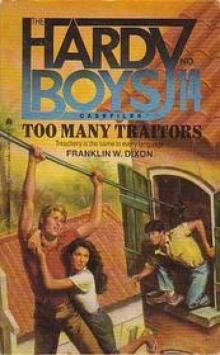 Too Many Traitors
Too Many Traitors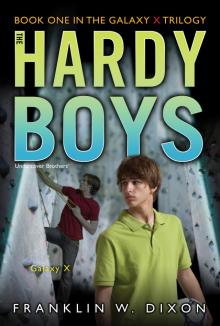 Galaxy X
Galaxy X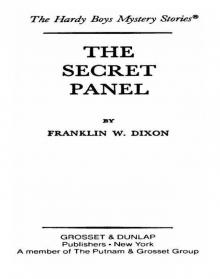 The Secret Panel
The Secret Panel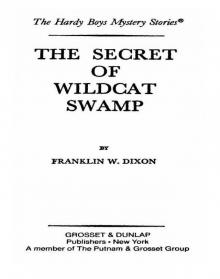 The Secret of Wildcat Swamp
The Secret of Wildcat Swamp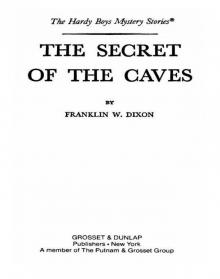 The Secret of the Caves
The Secret of the Caves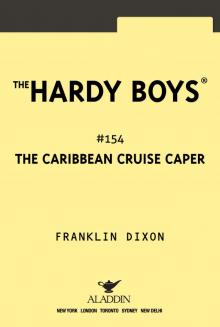 The Caribbean Cruise Caper
The Caribbean Cruise Caper Without a Trace
Without a Trace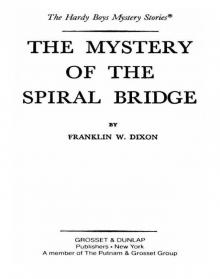 The Mystery of the Spiral Bridge
The Mystery of the Spiral Bridge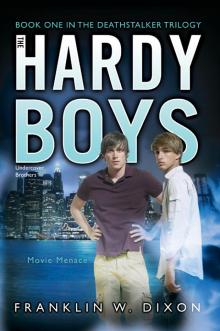 Movie Menace
Movie Menace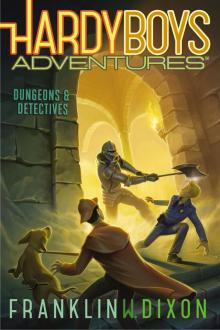 Dungeons & Detectives
Dungeons & Detectives Water-Ski Wipeout
Water-Ski Wipeout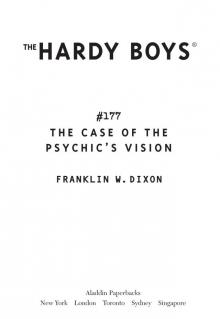 The Case of the Psychic's Vision
The Case of the Psychic's Vision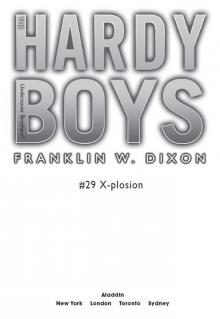 X-plosion
X-plosion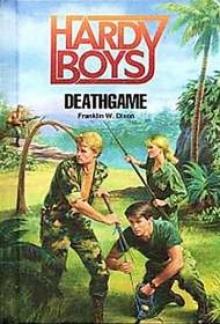 Deathgame
Deathgame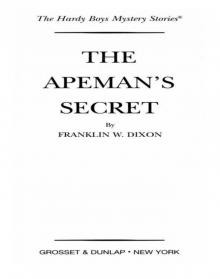 The Apeman's Secret
The Apeman's Secret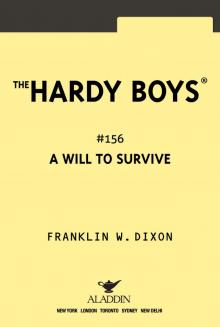 A Will to Survive
A Will to Survive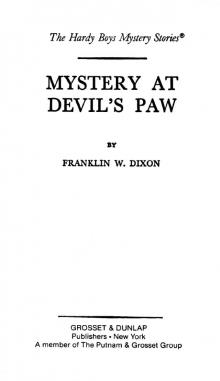 Mystery at Devil's Paw
Mystery at Devil's Paw Blood Money
Blood Money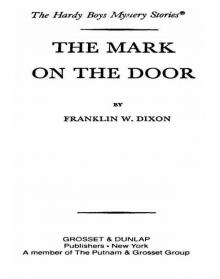 The Mark on the Door
The Mark on the Door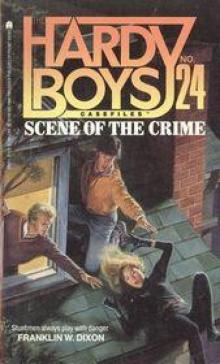 Scene of the Crime
Scene of the Crime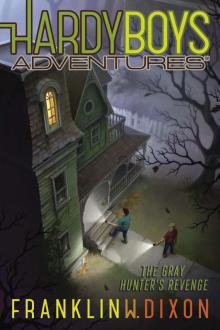 The Gray Hunter's Revenge
The Gray Hunter's Revenge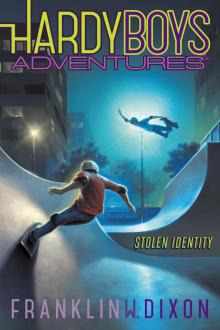 Stolen Identity
Stolen Identity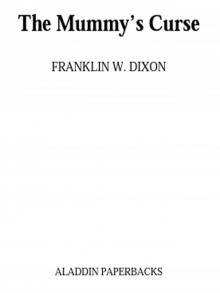 The Mummy's Curse
The Mummy's Curse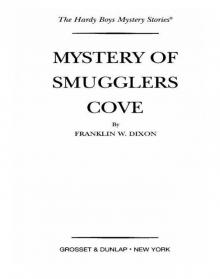 Mystery of Smugglers Cove
Mystery of Smugglers Cove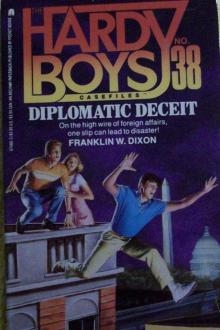 Diplomatic Deceit
Diplomatic Deceit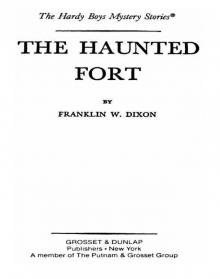 The Haunted Fort
The Haunted Fort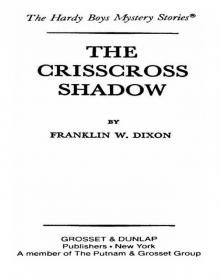 The Crisscross Shadow
The Crisscross Shadow Secret of the Red Arrow
Secret of the Red Arrow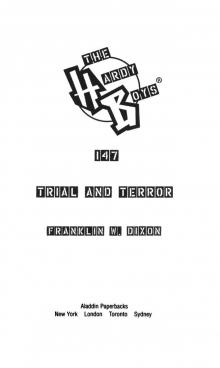 Trial and Terror
Trial and Terror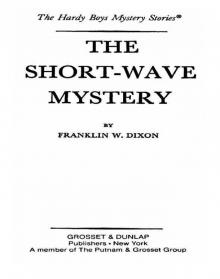 The Short-Wave Mystery
The Short-Wave Mystery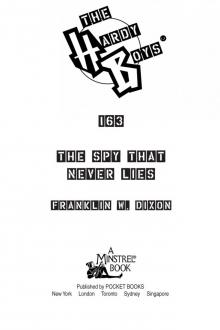 The Spy That Never Lies
The Spy That Never Lies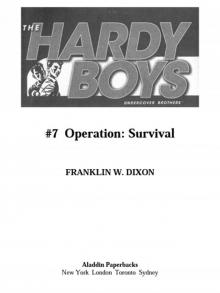 Operation: Survival
Operation: Survival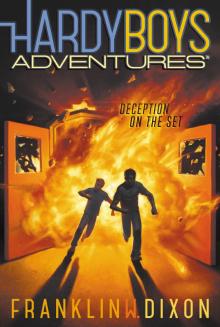 Deception on the Set
Deception on the Set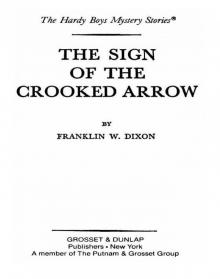 The Sign of the Crooked Arrow
The Sign of the Crooked Arrow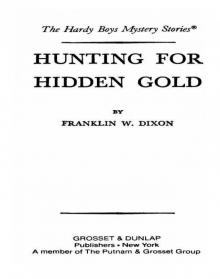 Hunting for Hidden Gold
Hunting for Hidden Gold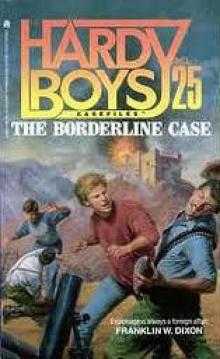 Disaster for Hire
Disaster for Hire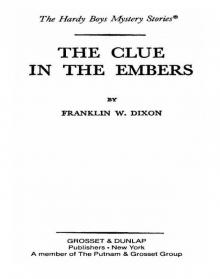 The Clue in the Embers
The Clue in the Embers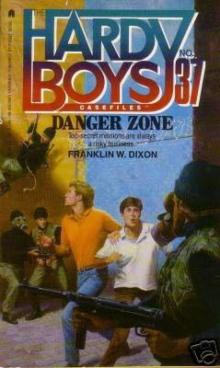 Danger Zone
Danger Zone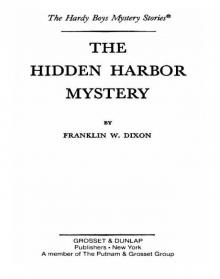 The Hidden Harbor Mystery
The Hidden Harbor Mystery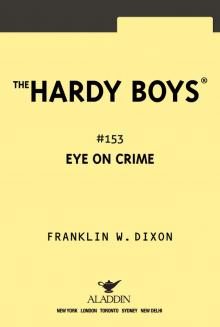 Eye on Crime
Eye on Crime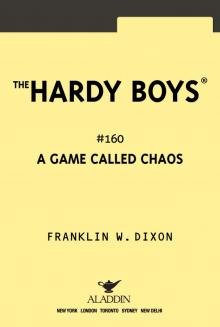 A Game Called Chaos
A Game Called Chaos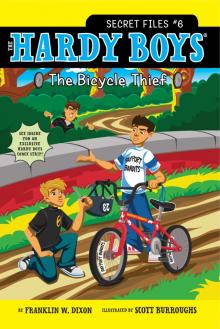 The Bicycle Thief
The Bicycle Thief The Missing Playbook
The Missing Playbook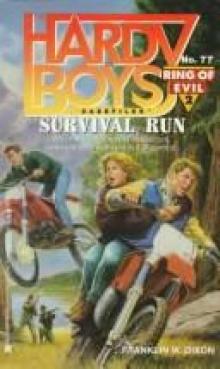 Survival Run
Survival Run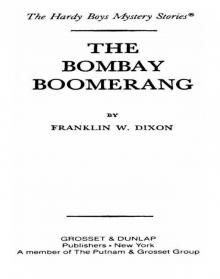 The Bombay Boomerang
The Bombay Boomerang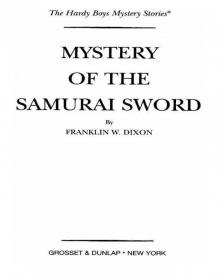 Mystery of the Samurai Sword
Mystery of the Samurai Sword Burned
Burned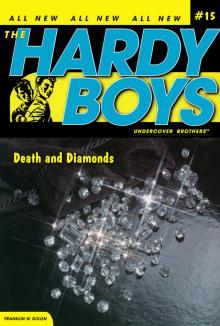 Death and Diamonds
Death and Diamonds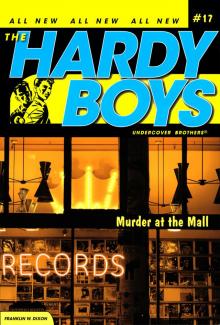 Murder at the Mall
Murder at the Mall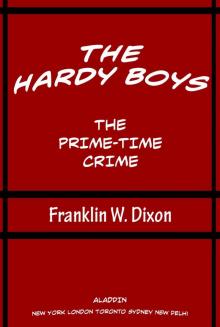 The Prime-Time Crime
The Prime-Time Crime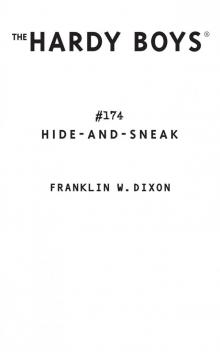 Hide-and-Sneak
Hide-and-Sneak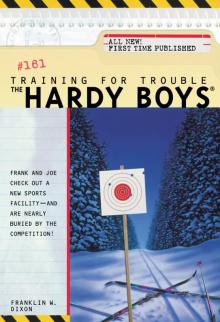 Training for Trouble
Training for Trouble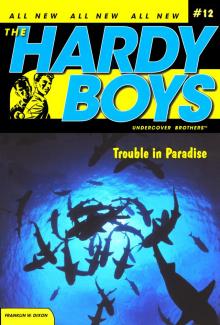 Trouble in Paradise
Trouble in Paradise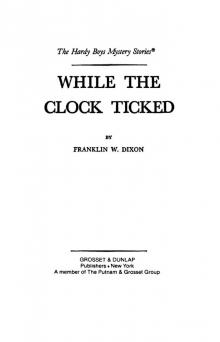 While the Clock Ticked
While the Clock Ticked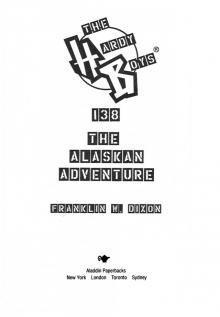 The Alaskan Adventure
The Alaskan Adventure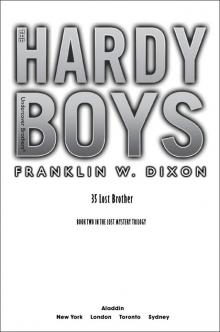 The Lost Brother
The Lost Brother Tunnel of Secrets
Tunnel of Secrets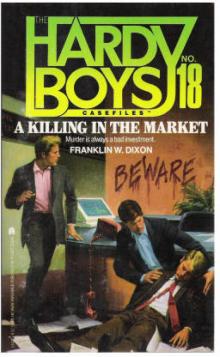 A Killing in the Market
A Killing in the Market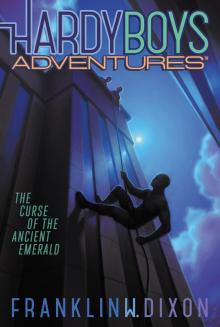 The Curse of the Ancient Emerald
The Curse of the Ancient Emerald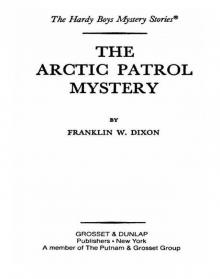 The Arctic Patrol Mystery
The Arctic Patrol Mystery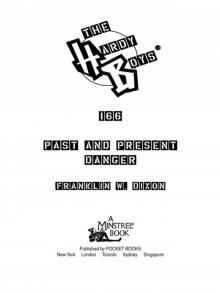 Past and Present Danger
Past and Present Danger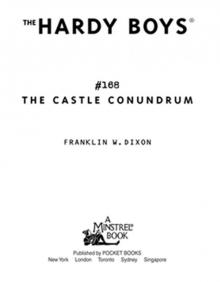 The Castle Conundrum (Hardy Boys)
The Castle Conundrum (Hardy Boys)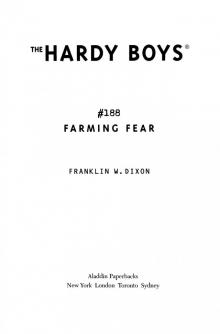 Farming Fear
Farming Fear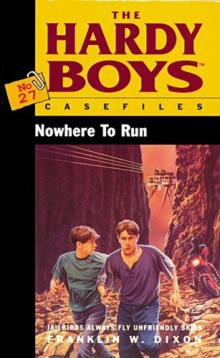 Nowhere to Run
Nowhere to Run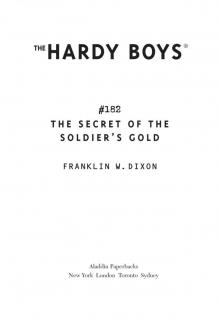 The Secret of the Soldier's Gold
The Secret of the Soldier's Gold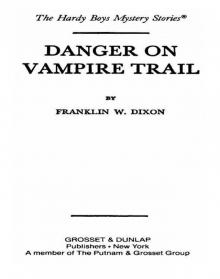 Danger on Vampire Trail
Danger on Vampire Trail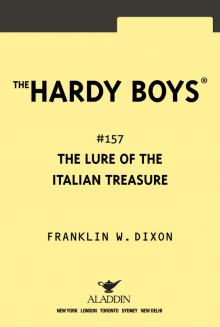 The Lure of the Italian Treasure
The Lure of the Italian Treasure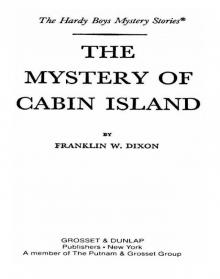 The Mystery of Cabin Island
The Mystery of Cabin Island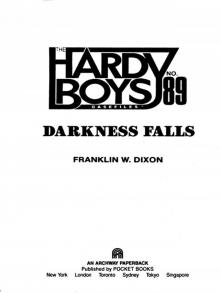 Darkness Falls
Darkness Falls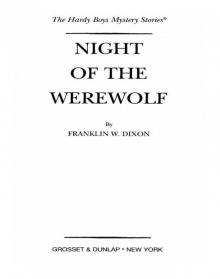 Night of the Werewolf
Night of the Werewolf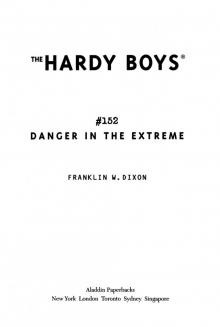 Danger in the Extreme
Danger in the Extreme The Lazarus Plot
The Lazarus Plot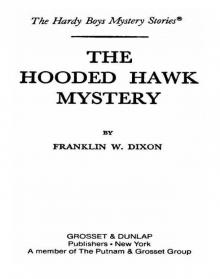 The Hooded Hawk Mystery
The Hooded Hawk Mystery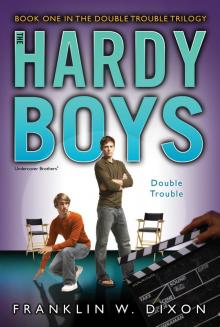 Double Trouble
Double Trouble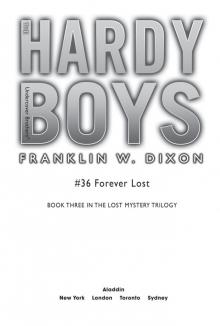 Forever Lost
Forever Lost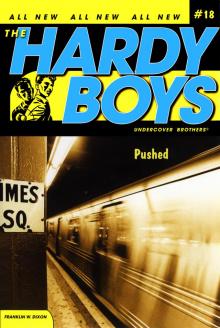 Pushed
Pushed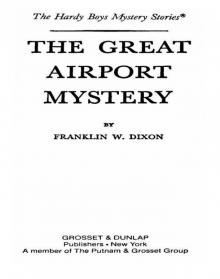 The Great Airport Mystery
The Great Airport Mystery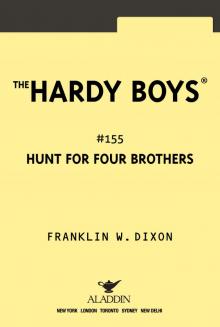 The Hunt for Four Brothers
The Hunt for Four Brothers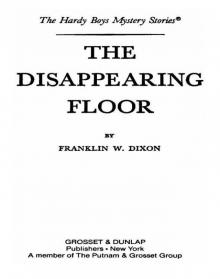 The Disappearing Floor
The Disappearing Floor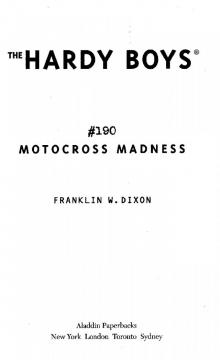 Motocross Madness
Motocross Madness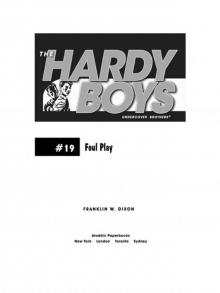 Foul Play
Foul Play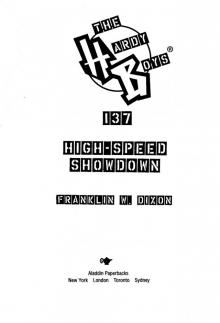 High-Speed Showdown
High-Speed Showdown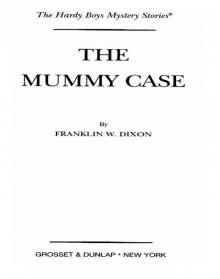 The Mummy Case
The Mummy Case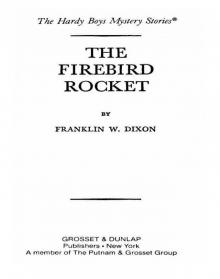 The Firebird Rocket
The Firebird Rocket Trouble in Warp Space
Trouble in Warp Space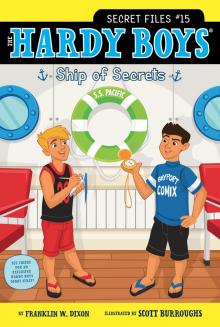 Ship of Secrets
Ship of Secrets Line of Fire
Line of Fire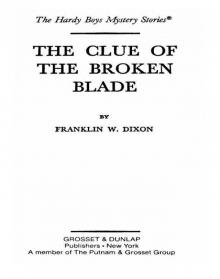 The Clue of the Broken Blade
The Clue of the Broken Blade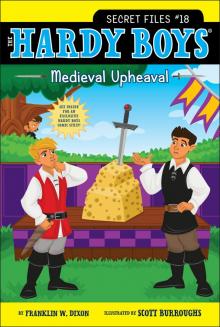 Medieval Upheaval
Medieval Upheaval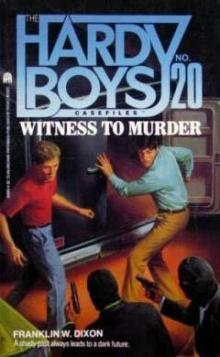 Witness to Murder
Witness to Murder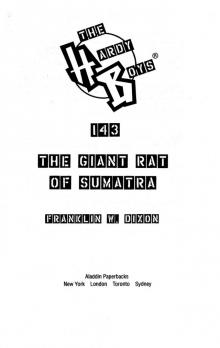 The Giant Rat of Sumatra
The Giant Rat of Sumatra Attack of the Bayport Beast
Attack of the Bayport Beast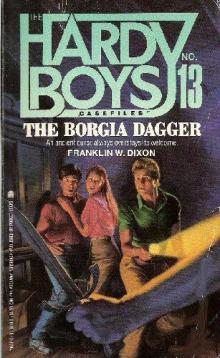 The Borgia Dagger
The Borgia Dagger Scavenger Hunt Heist
Scavenger Hunt Heist No Way Out
No Way Out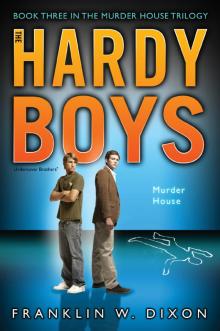 Murder House
Murder House The X-Factor
The X-Factor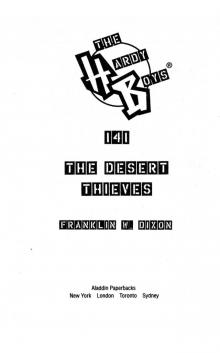 The Desert Thieves
The Desert Thieves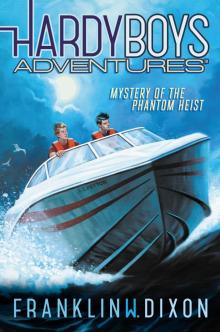 Mystery of the Phantom Heist
Mystery of the Phantom Heist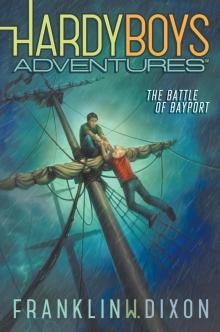 The Battle of Bayport
The Battle of Bayport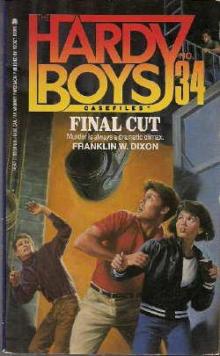 Final Cut
Final Cut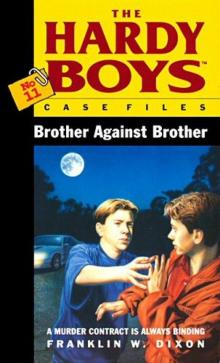 Brother Against Brother
Brother Against Brother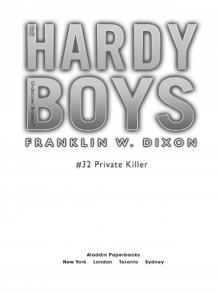 Private Killer
Private Killer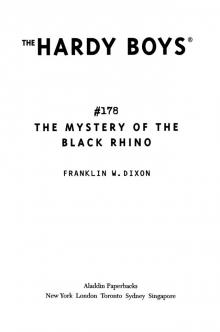 The Mystery of the Black Rhino
The Mystery of the Black Rhino Feeding Frenzy
Feeding Frenzy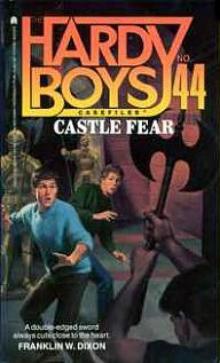 Castle Fear
Castle Fear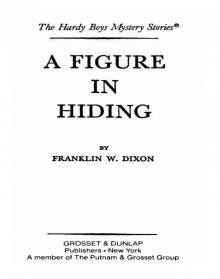 A Figure in Hiding
A Figure in Hiding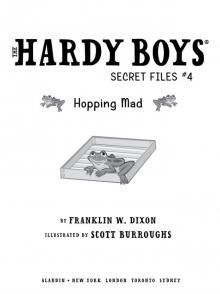 Hopping Mad
Hopping Mad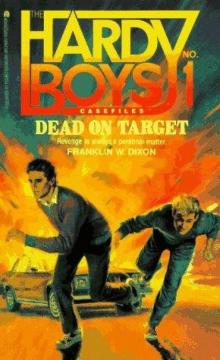 Dead on Target
Dead on Target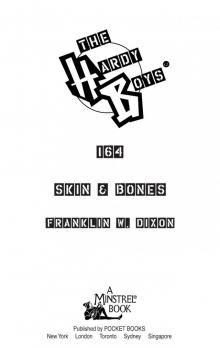 Skin and Bones
Skin and Bones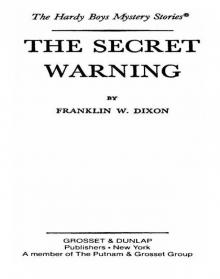 The Secret Warning
The Secret Warning Flesh and Blood
Flesh and Blood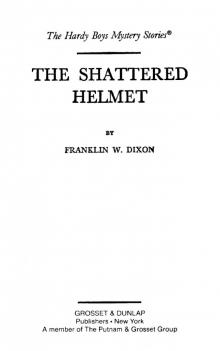 The Shattered Helmet
The Shattered Helmet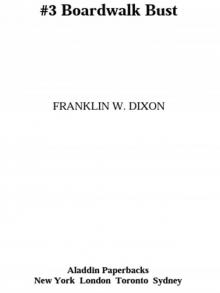 Boardwalk Bust
Boardwalk Bust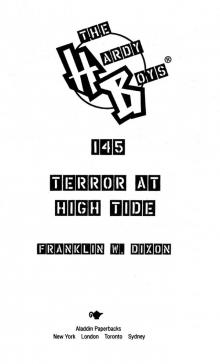 Terror at High Tide
Terror at High Tide In Plane Sight
In Plane Sight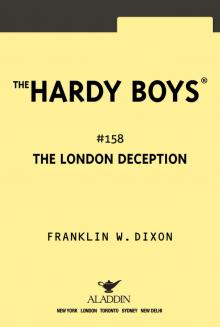 The London Deception
The London Deception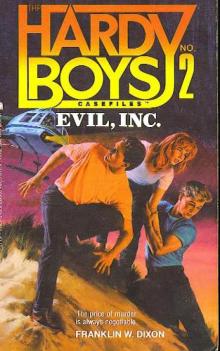 Evil, Inc.
Evil, Inc.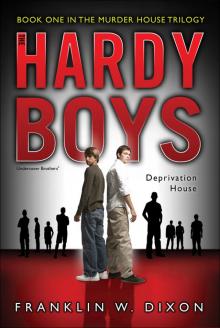 Deprivation House
Deprivation House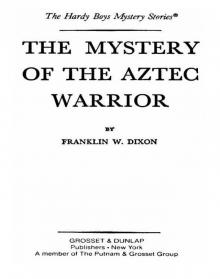 The Mystery of the Aztec Warrior
The Mystery of the Aztec Warrior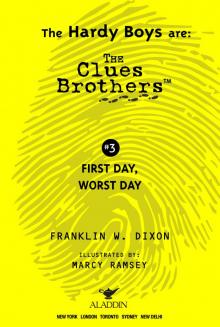 First Day, Worst Day
First Day, Worst Day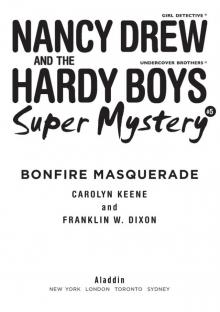 Bonfire Masquerade
Bonfire Masquerade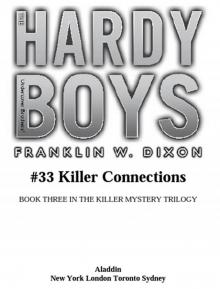 Killer Connections
Killer Connections Strategic Moves
Strategic Moves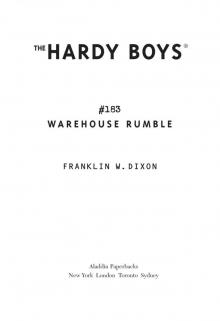 Warehouse Rumble
Warehouse Rumble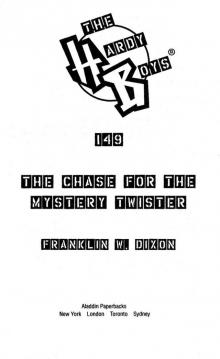 The Chase for the Mystery Twister
The Chase for the Mystery Twister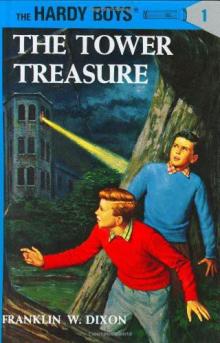 The Tower Treasure thb-1
The Tower Treasure thb-1 The Children of the Lost
The Children of the Lost The Last Laugh
The Last Laugh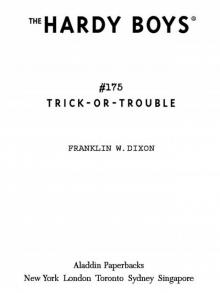 Trick-or-Trouble
Trick-or-Trouble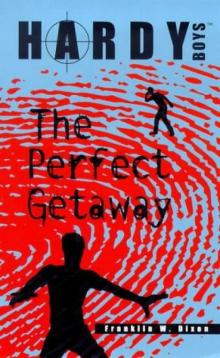 Perfect Getaway
Perfect Getaway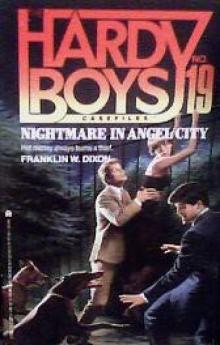 Nightmare in Angel City
Nightmare in Angel City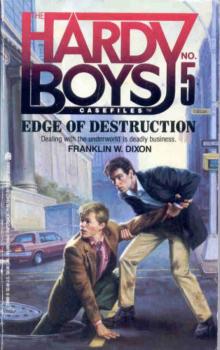 Edge of Destruction
Edge of Destruction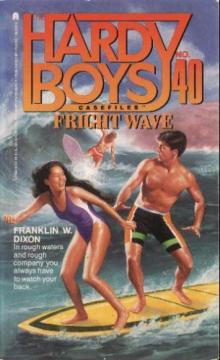 Fright Wave
Fright Wave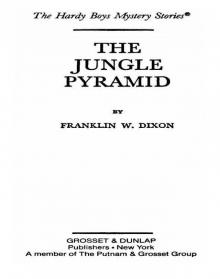 The Jungle Pyramid
The Jungle Pyramid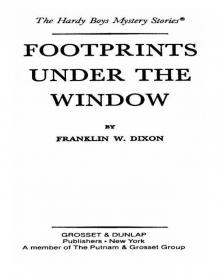 Footprints Under the Window
Footprints Under the Window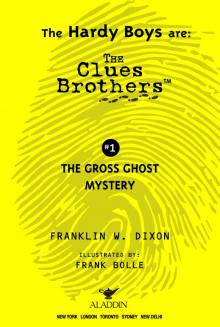 The Gross Ghost Mystery
The Gross Ghost Mystery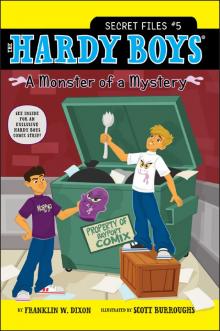 A Monster of a Mystery
A Monster of a Mystery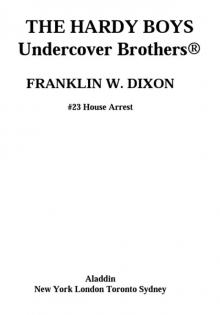 House Arrest
House Arrest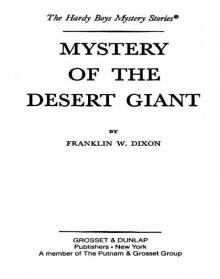 Mystery of the Desert Giant
Mystery of the Desert Giant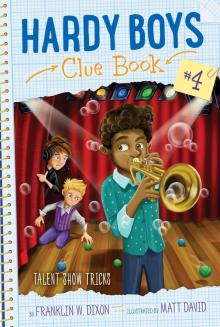 Talent Show Tricks
Talent Show Tricks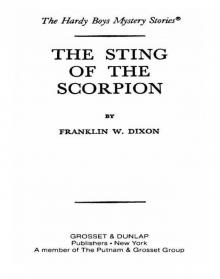 The Sting of the Scorpion
The Sting of the Scorpion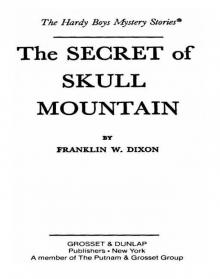 The Secret of Skull Mountain
The Secret of Skull Mountain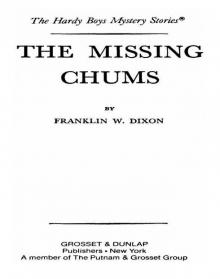 The Missing Chums
The Missing Chums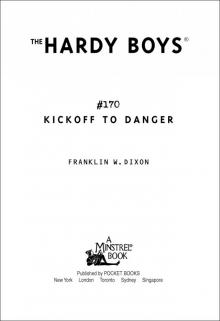 Kickoff to Danger
Kickoff to Danger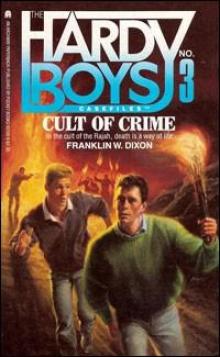 Cult of Crime
Cult of Crime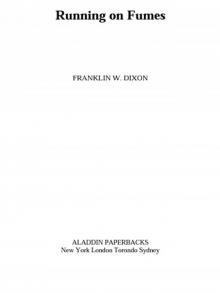 Running on Fumes
Running on Fumes Martial Law
Martial Law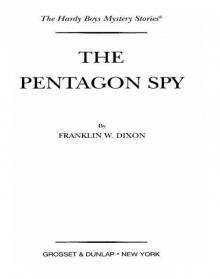 The Pentagon Spy
The Pentagon Spy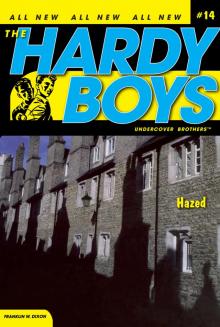 Hazed
Hazed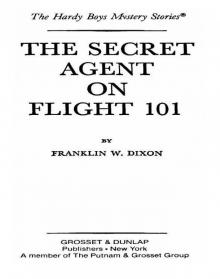 The Secret Agent on Flight 101
The Secret Agent on Flight 101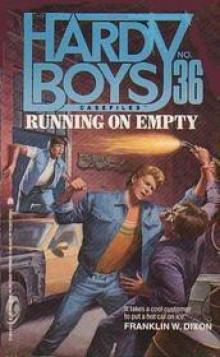 Running on Empty
Running on Empty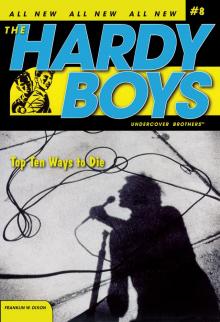 Top Ten Ways to Die
Top Ten Ways to Die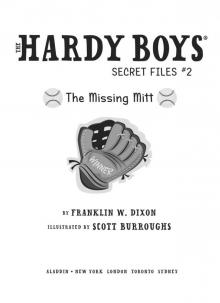 The Missing Mitt
The Missing Mitt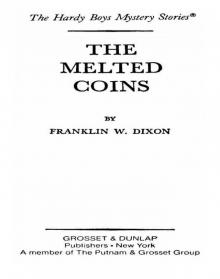 The Melted Coins
The Melted Coins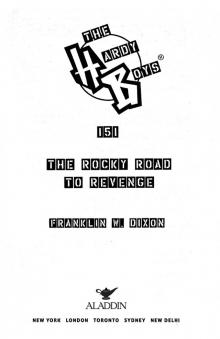 The Rocky Road to Revenge
The Rocky Road to Revenge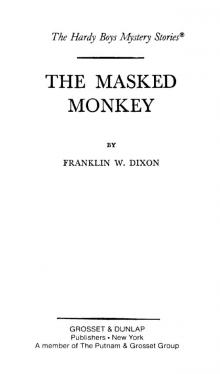 The Masked Monkey
The Masked Monkey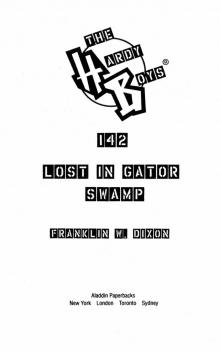 Lost in Gator Swamp
Lost in Gator Swamp Extreme Danger
Extreme Danger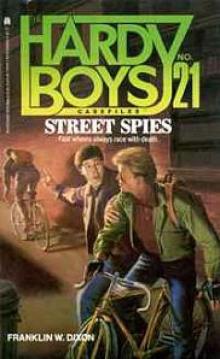 Street Spies
Street Spies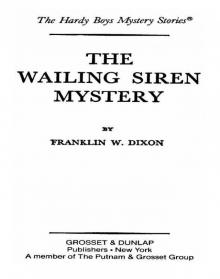 The Wailing Siren Mystery
The Wailing Siren Mystery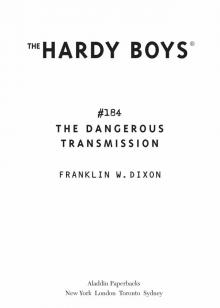 The Dangerous Transmission
The Dangerous Transmission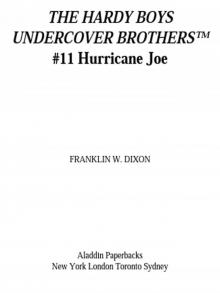 Hurricane Joe
Hurricane Joe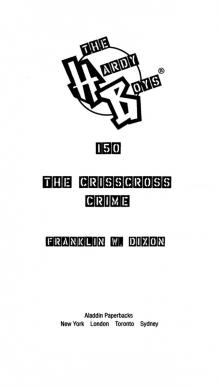 The Crisscross Crime
The Crisscross Crime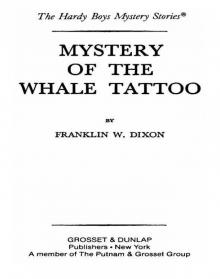 Mystery of the Whale Tattoo
Mystery of the Whale Tattoo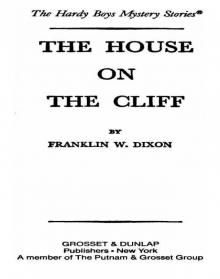 The House on the Cliff
The House on the Cliff Camping Chaos
Camping Chaos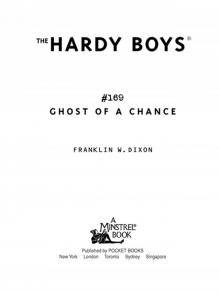 Ghost of a Chance
Ghost of a Chance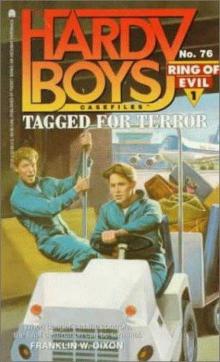 Tagged for Terror
Tagged for Terror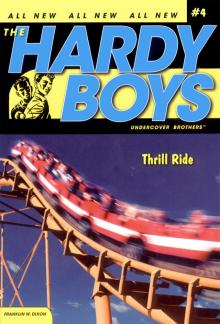 Thrill Ride
Thrill Ride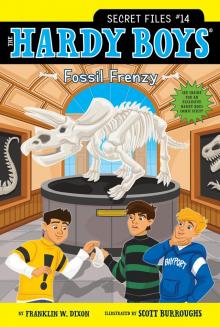 Fossil Frenzy
Fossil Frenzy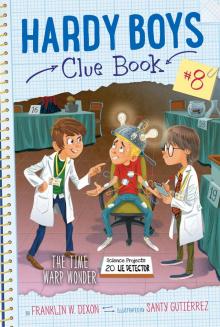 The Time Warp Wonder
The Time Warp Wonder Ghost Stories
Ghost Stories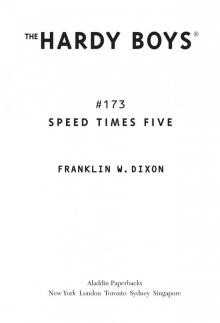 Speed Times Five
Speed Times Five What Happened at Midnight
What Happened at Midnight Three-Ring Terror
Three-Ring Terror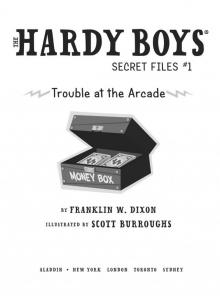 Trouble at the Arcade
Trouble at the Arcade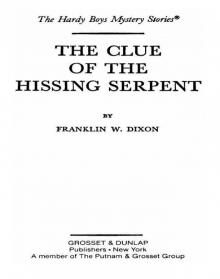 The Clue of the Hissing Serpent
The Clue of the Hissing Serpent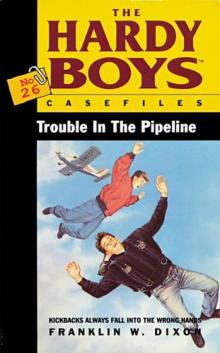 Trouble in the Pipeline
Trouble in the Pipeline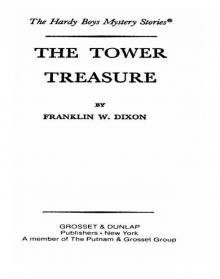 The Tower Treasure
The Tower Treasure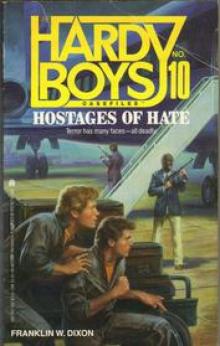 Hostages of Hate
Hostages of Hate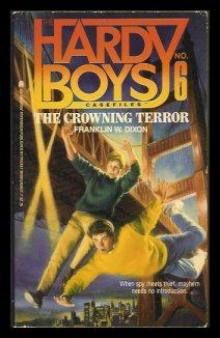 The Crowning Terror
The Crowning Terror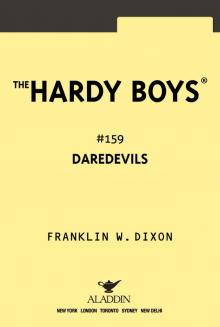 Daredevils
Daredevils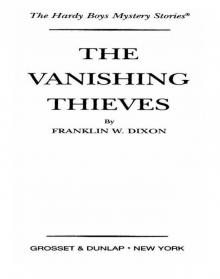 The Vanishing Thieves
The Vanishing Thieves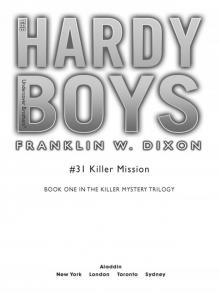 Killer Mission
Killer Mission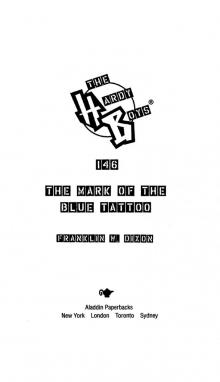 The Mark of the Blue Tattoo
The Mark of the Blue Tattoo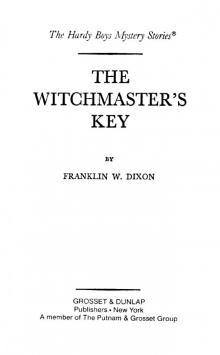 The Witchmaster's Key
The Witchmaster's Key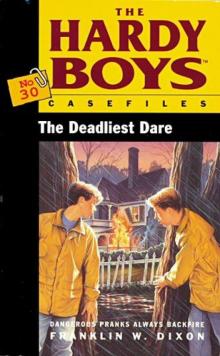 The Deadliest Dare
The Deadliest Dare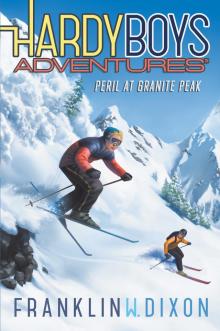 Peril at Granite Peak
Peril at Granite Peak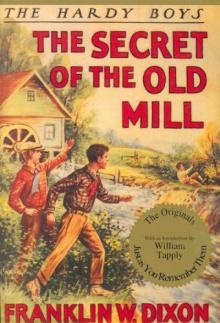 The Secret Of The Old Mill thb-3
The Secret Of The Old Mill thb-3 Rocky Road
Rocky Road The Demolition Mission
The Demolition Mission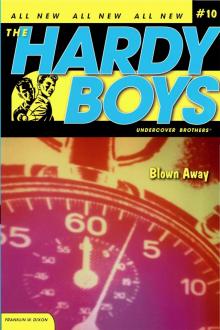 Blown Away
Blown Away Passport to Danger
Passport to Danger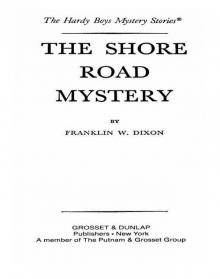 The Shore Road Mystery
The Shore Road Mystery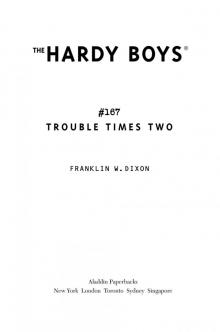 Trouble Times Two
Trouble Times Two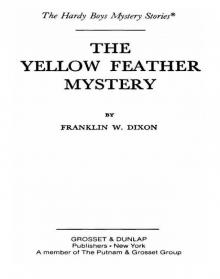 The Yellow Feather Mystery
The Yellow Feather Mystery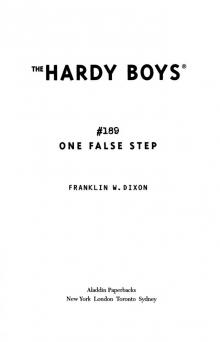 One False Step
One False Step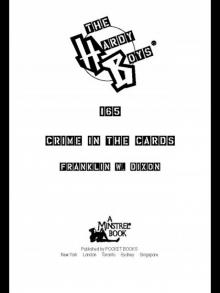 Crime in the Cards
Crime in the Cards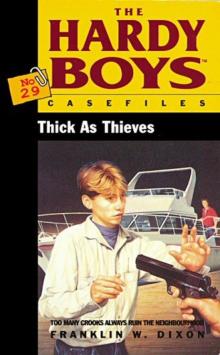 Thick as Thieves
Thick as Thieves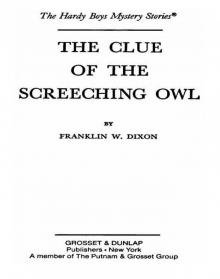 The Clue of the Screeching Owl
The Clue of the Screeching Owl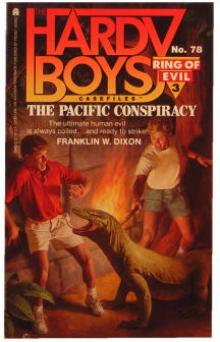 The Pacific Conspiracy
The Pacific Conspiracy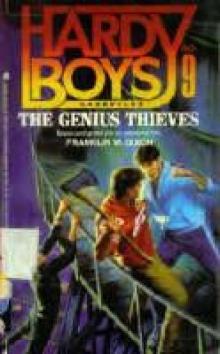 The Genius Thieves
The Genius Thieves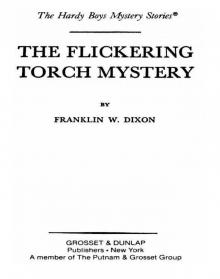 The Flickering Torch Mystery
The Flickering Torch Mystery Into Thin Air
Into Thin Air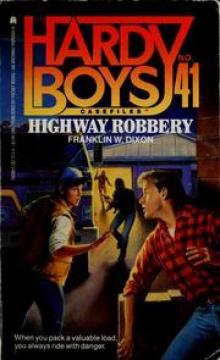 Highway Robbery
Highway Robbery Deadfall
Deadfall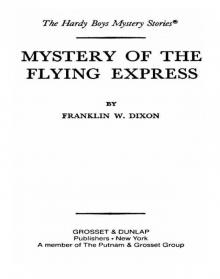 Mystery of the Flying Express
Mystery of the Flying Express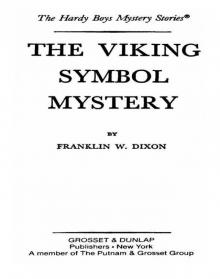 The Viking Symbol Mystery
The Viking Symbol Mystery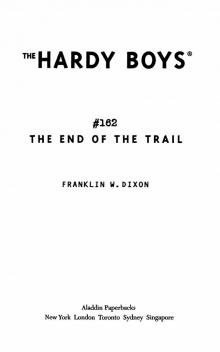 The End of the Trail
The End of the Trail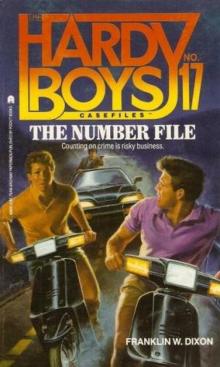 The Number File
The Number File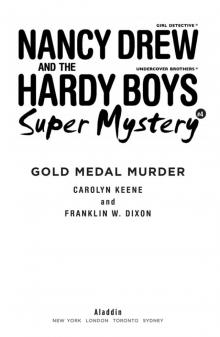 Gold Medal Murder
Gold Medal Murder Bound for Danger
Bound for Danger Collision Course
Collision Course The Madman of Black Bear Mountain
The Madman of Black Bear Mountain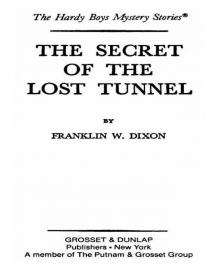 The Secret of the Lost Tunnel
The Secret of the Lost Tunnel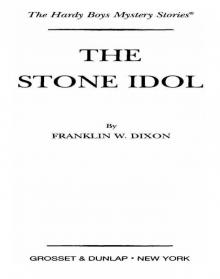 The Stone Idol
The Stone Idol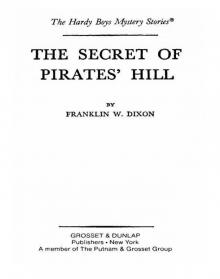 The Secret of Pirates' Hill
The Secret of Pirates' Hill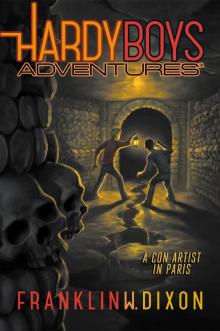 A Con Artist in Paris
A Con Artist in Paris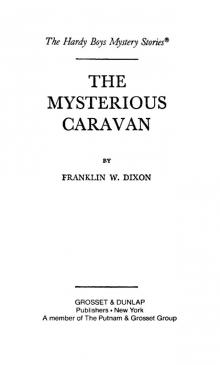 The Mysterious Caravan
The Mysterious Caravan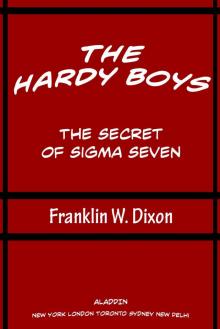 The Secret of Sigma Seven
The Secret of Sigma Seven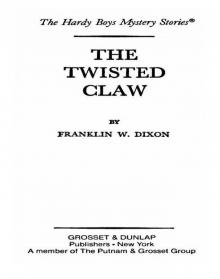 The Twisted Claw
The Twisted Claw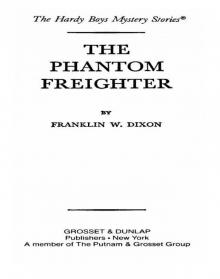 The Phantom Freighter
The Phantom Freighter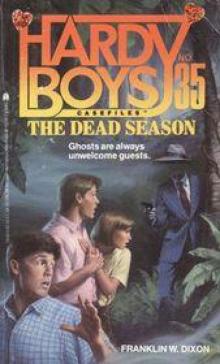 The Dead Season
The Dead Season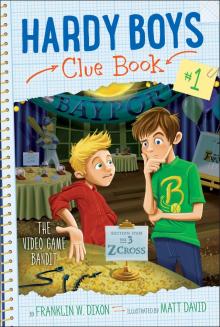 The Video Game Bandit
The Video Game Bandit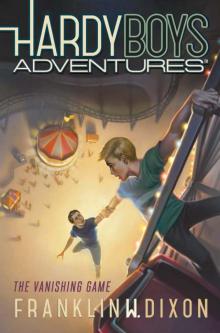 The Vanishing Game
The Vanishing Game Typhoon Island
Typhoon Island